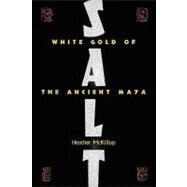Salt
, by McKillop, Heather- ISBN: 9780813033433 | 0813033438
- Cover: Paperback
- Copyright: 11/15/2008
"McKillop has completed a remarkable task in bringing out significant new data concerning ancient Maya salt making. The implications of environmental exploitation, technological development, and economic possibilities provide the opportunity to revisit these issues on more solid ground."--Fred Valdez Jr., University of Texas, Austin "Long-accepted ideas about Late Classic activities and the role of coastal communities in supporting Late Classic society--even the society of Tikal and the Peten--will now have to change as the result of McKillop's findings."--Elizabeth Graham, University College London In Salt: White Gold of the Ancient Maya, Heather McKillop reports the discovery, excavation, and interpretation of Late Classic Maya salt works on the coast of Belize, transforming our knowledge of the Maya salt trade and craft specialization while providing new insights on sea-level rise in the Late Holocene as well. Salt, basic to human existence, was scarce in the tropical rainforests of Belize and Guatemala, where the Classic Maya civilization thrived between A.D. 300 and 900. The prevailing interpretation has been that salt was imported from the north coast of the Yucatan. However, the underwater discovery and excavation of salt works in Punta Ycacos Lagoon demonstrate that the Maya produced salt by boiling brine in pots over fires at specialized workshops on the Belizean coast. The Punta Ycacos salt works are clear evidence that craft specialization took place in a nondomestic setting and that production occurred away from the economic and political power of the urban Maya rulers, thus providing new clues to the Maya economy and sea trade. McKillop also presents new data on sea-level rise in the Late Holocene that extend geologists' and geographers' sea-level curves from earlier eras. Likewise, she enters the environmental-versus-cultural debate over the Classic Maya collapse by evaluating the factors that led to the abandonment of the Punta Ycacos salt works at the end of the Classic Period, synonymous with the abandonment of inland Maya cities. Heather McKillop is associate professor of anthropology at Louisiana State University.







